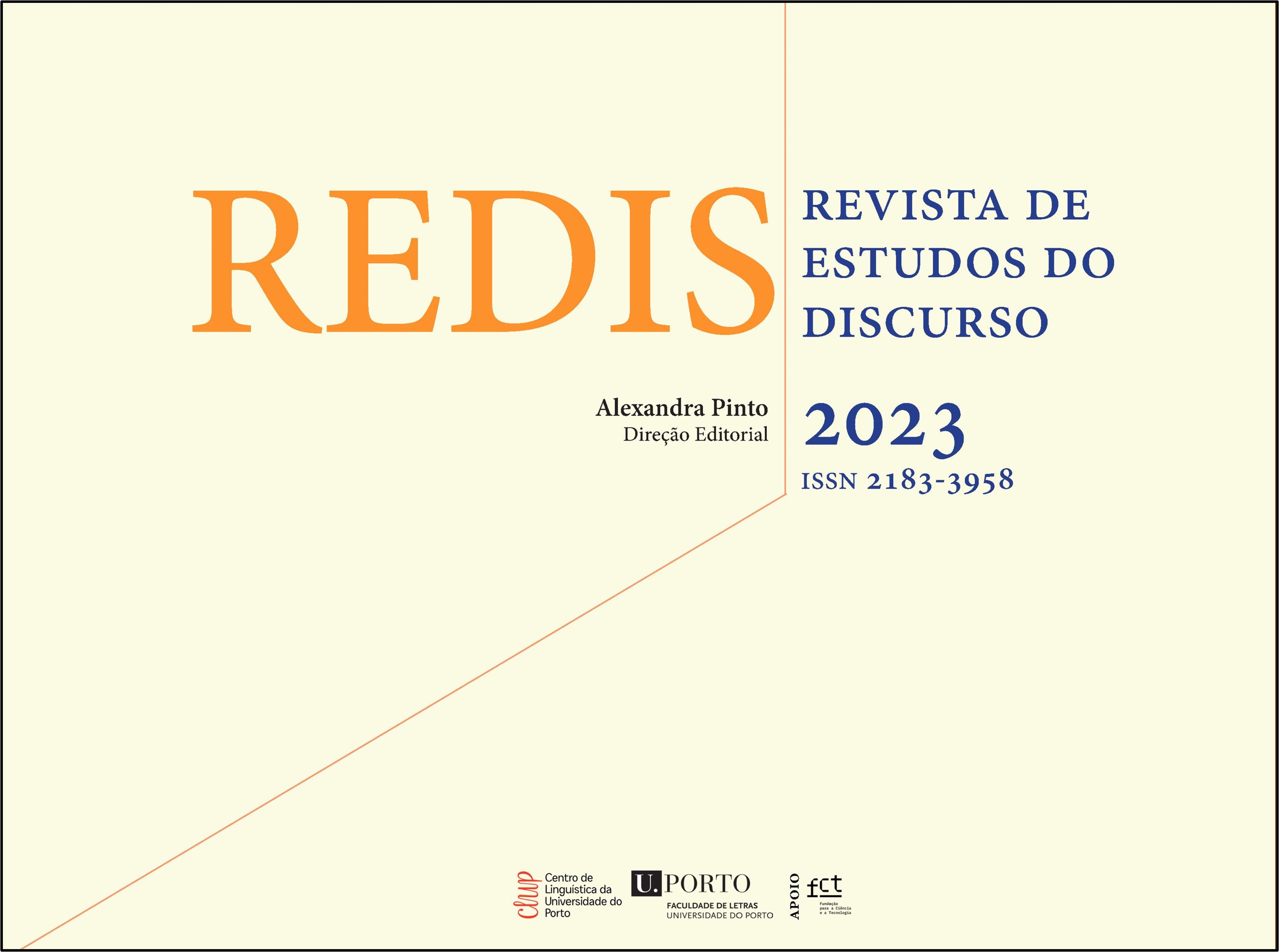Formas de tratamento no português europeu: algumas considerações sobre formas neutras e não neutras
DOI:
https://doi.org/10.21747/21833958/red13a8Palavras-chave:
Formas de Tratamento, Você, Forma Neutra, 3.ª Pessoa, Sistema T-N-VResumo
As formas de tratamento na língua portuguesa são complexas e parecem ser uma área da língua em variação rápida. Essas formas, pela sua gradação, complexidade e subtileza, geram confusão e até conflitos entre os falantes. No presente trabalho, guiados, inicialmente, por Cintra (1972) e por Allen (2019), a que juntámos depois outros contributos, fazemos uma incursão na variedade de formas existente no português europeu contemporâneo e, ao mesmo tempo, procuramos compreender a evolução desse sistema multifacetado, desde antes da fundação da língua portuguesa. Focalizamos, particularmente, uma forma de tratamento em alguns casos problemática: o “você”, relacionando-a com a forma alternativa da 3.ª pessoa sem sujeito explícito. Procedemos, por fim, a um pequeno estudo exploratório com recolha de dados, que, apesar de limitada, nos permitiu obter alguns resultados, quer relativos às potencialidades da 3.ª pessoa, sem sujeito, quer quanto ao uso do pronome “você” por determinados estratos sociais.
Referências
Aguiar, J. & Paiva, M. C. (2017). Vocês tenham cuidado, sois educadas para isso. In P. Barbosa; M da C Paiva & C. Rodrigues, Studies on variation in Portuguese (135-150). Amsterdão: John Benjamins.
Allen, A. S. F. (2019). O Sistema de Formas de Tratamento em Português Europeu [Dissertação de Mestrado] FLUL.
Barbosa et al. (2014). Perfil sociolinguístico da fala bracarense [Corpus]. CEHUM. http://cehum.ilch.uminho.pt/fala_bracarense.
Blanco, M. L. (2002). Conversas com António Lobo Antunes. Lisboa: D. Quixote.
Brown, R. & Gilman, A. (1968). The pronouns of power and solidarity. Readings in the Sociology of Language (252-276). Berlim: De Gruyter Mouton.
Brown, P. & Levinson, S. (1987). Politeness: Some Universals in Language Usage. Cambridge University Press.
Cardeira, E. (2008). O português medieval: koinização e elaboração. Veredas, Revista da Associação Internacional de Lusitanistas, vol. 9, 155-176.
Carreira, M. H. A. (1997). Modalisation linguistique en situation d’interlocution: proxémique verbale et modalités en portugais. Louvain - Paris, Peeters, col. Bibliotèque de l’Information gramaticale.
Carreira, M. H. A. (2004). Formas de Tratamento de Português como Designação do Outro e de Si: Perspectivas de Investigação e de Transposição Didáctica. Universidade Paris VII.
Cintra, L. (1972). Sobre Formas de Tratamento na Língua Portuguesa. Lisboa: Livros Horizonte.
Cook, M. (1997). Uma Teoria de Interpretação das Formas de Tratamento na Língua Portuguesa, Hispania, vol. 80, nº. 3, 451-464.
Duarte, I. M. (2010). Formas de tratamento: item gramatical no ensino do Português Língua Materna. In A.M. Brito (org), Gramática: história, teorias, aplicações. (133-146). CLUP – FLUP.
Duarte, I. M. (2011). Formas de tratamento em português: entre léxico e discurso. Matraga, Revista do Programa de Pós-Graduação em Letras da UERJ, 18 (28), 84-101.
Faraco, C. A. (2017). O tratamento “você” em português: uma abordagem histórica. Labor Histórico, Rio de Janeiro, 3(2), 114-132.
Faria, M. (2022). Algumas considerações sobre a produção e a aceitação de formas dos paradigmas vós/vocês. REDIS, nº 11, 118-155.
Faria, R. (2009). O fenómeno da delicadeza linguística em Português e em Inglês. Tese de doutoramento, Lisboa, Faculdade de Ciências Humanas, Universidade Católica Portuguesa.
Guilherme, A. R. & Bermejo V. (2015). Quão cortês é você? O pronome de tratamento você em Português Europeu. Labor Histórico, Rio de Janeiro, 1(2), 167-180.
Hammermüller, G. (1993). Die Anrede im Portugiesischen. Eine sociolinguistische Untersuchung zu Anredekonventionem des gegenwärtgen europäischen Portugiesisch Chemitz, Never Verlag.
Hammermüller, G. (2004). Adresser ou eviter, c’est la question… Comment s’adresser à quelqu’un en portugais sans avoir recours à un pronom ou à une autre forme équivalente. Disponível em:
https://cvc. cervantes.es/lengua/coloquio_paris/ponencias/pdf/cvc_
Lešková, J. (2012). As formas de tratamento em Português Europeu [Dissertação de Mestrado] Faculdade de Filosofia da Universidade Palackého V Olomouci.
Lopes, C. R. & Mota M.A. (2019). A percepção e a aceitabilidade de formas de tratamento no português europeu (PE): uma abordagem experimental. Revista Working Papers em Linguística, Florianópolis, 20(2), 135-174.
Nascentes, A. (1956). O tratamento de ‘você’ no Brasil, Revista Letras, nº 5/6, 114-122.
Ponce de León, R. (2008). Gramática y Traducción en la Historia de la enseñanza-aprendizaje del portugués en España La Gramática Elemental de la Lengua Portuguesa (Heidelberg, 1911) de Francisco Carrillo Guerrero. In X. M. Dasilva (ed.) Perfiles de la traducción hispano-portuguesa II (113-127). Vigo: Editorial Academia del Hispanismo
Kerbrat-Orecchioni, C. ((1996) 2006). Análise da Conversação – Princípios e Métodos, Editora Parábola.
Santos Luz, M. (1956). Fórmulas de tratamento no português arcaico. Revista portuguesa de filologia. N. 7, 251-363.
Downloads
Publicado
Como Citar
Edição
Secção
Licença
Direitos de Autor (c) 2023 Renato Roque, Alexandra Guedes Pinto

Este trabalho encontra-se publicado com a Licença Internacional Creative Commons Atribuição 4.0.
Os autores cedem à REDIS: Revista de Estudos do Discurso, o direito exclusivo de publicação dos seus textos, sob qualquer meio, incluindo a sua reprodução e venda em suporte papel ou digital, bem como a sua disponibilização em regime de livre acesso em bases de dados.




